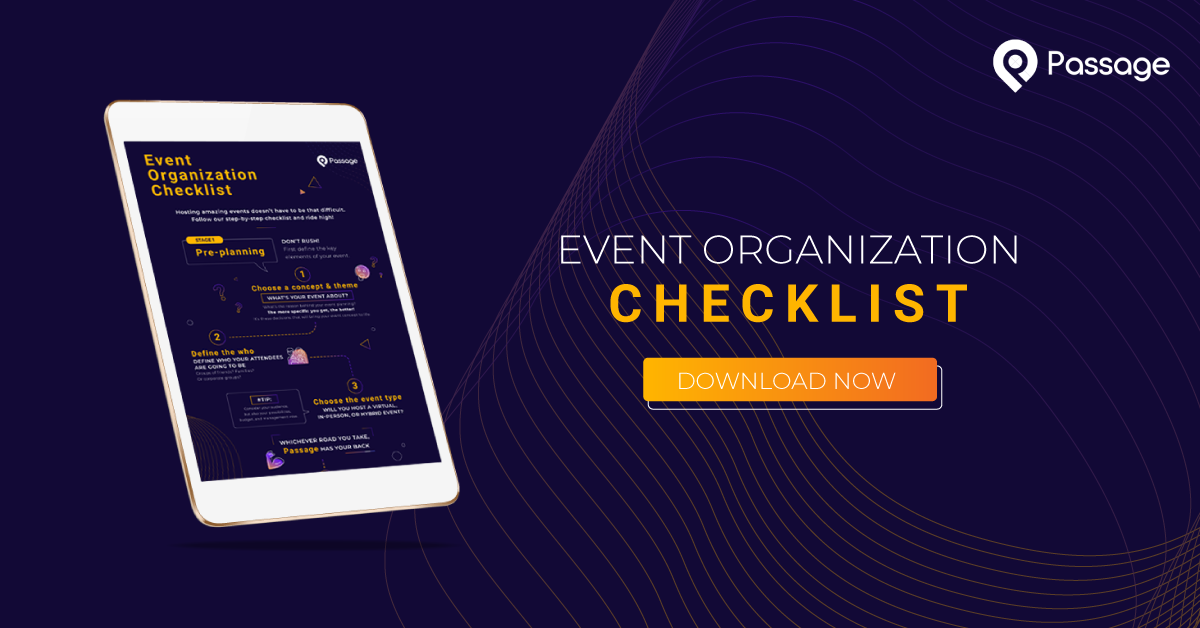Whether it's your first event or your 99th, managing an event budget can be challenging. Every decision you make will have an impact on your event– either good or bad.
This might seem overwhelming, but don't panic. A budget is an incredibly useful tool that can help you stay on track as you plan your event (and can sometimes make decisions easier, not harder).
If you want to manage your event budget like a pro, ask yourself these ten key questions when planning your next event.
Have you checked all of these off of your list?
Everything Starts in The Planning Stage
Before spending any money, you need to establish your event budget. Start by determining your expenses, revenue, and all other relevant indicators that should be tracked down. Here are a few examples that might help you out.
-
Fixed costs: These are invariable expenses that will remain constant so they are easier to track, such as your staff’s salaries or the venue’s rental cost.
-
Variable costs: These are not as easy to determine, since they depend on other factors like the number of attendees; these can include the catering service, per-hour services, among others.
You may also want to organize your event budget in different categories, from tech and entertainment to food and beverages. The key here is to be as specific and detailed as possible: break down each category into smaller elements. This way, you can make an account for everything that is to be expected.
This will help you forecast how much–even though it may not be the exact figure–you will spend, so you can weigh it against what you want to spend.
From now on, your budget strategy will be your guide.
Question #1: Have You Done Your Research?
You need to research your options. This will help you decide how much you want to spend on each category of your event budget. You should talk to vendors, providers, check different venues, and make sure you have a clear picture of all the alternatives before making a decision.
For example, you could choose a more cost-effective option for merchandise but spend a little bit more on the venue. It’s a trade-off. Think about where you can make compromises if needed.
It’s important to ask yourself "What's the most important thing I want my guests to see or feel at my event?". You should establish your priorities and invest your funds in worthy options. This will help you to not go over your event budget repeatedly.
Question #2: How Will You Manage Your Cash Flow?
It’s super important for event producers to establish your cash flow management strategy.
Your cash flow represents the net amount of money that comes in and out of your pocketbook. Unlike your event budget, cash flow can change from day to day. Funds don't always come in and out on a perfect schedule. You need to keep an eye on your cash inflows and outflows to make sure you have enough money to pay vendor deposits and cover other up-front costs before your event.
This will be essential for your budget strategy.
Question #3: How Will You Track Expenses and Revenues?
Event producers NEED to be structured and detail-oriented. You should find the best way to:
-
Monitor different costs
-
Track expenses and revenue
-
Report regularly
To do this, there are thousands of event budget templates online that you can choose from. Try a few and choose the one that best suits your budget strategy.
Question #4: What Worked in The Past?
Consider historical data. If you've hosted events in the past, you can use those experiences to inform your budget for this one. Where did you over or underspend? Go look at your old reports from past events and learn from your previous mistakes–if there are any. This will also help you understand if your current event planning budget is appropriate, smaller, or larger than it’s supposed to be.
If this is your first time planning an event budget, look for a friend or colleague who has experience budgeting or producing events. They may be able to help prevent you from making some of the mistakes they made early in their careers.
Question #5: Is Your Event Budget Reasonable For Your Goals?
Think about the objectives you want to achieve with your event. Being realistic will set you up for success.
You need to know what you want to accomplish and analyze whether the money you’re spending on your venue, entertainers, or other elements will lead to your goal. If the answer is no, maybe you should start thinking about reallocating your money.
Question #6: How Much Can You Afford to Spend on Marketing?
Every event producer should consider marketing elements when creating their budget strategy.
Yes—social posts and emails are free. But there are other marketing efforts that might end up being expensive. For example, to reach more people and promote your event, you need to have a solid ads strategy. How much are you willing to spend? Are you aware of how much each platform might cost? Google, Facebook, or LinkedIn ads are not the same. You need to think about who you want to reach and how much money can be spent on your ads campaign. Being informed will help you not go over your event budget.
What about partnering with influencers? If you are interested in reaching a targeted audience, social media influencers are KEY. And, of course, you’ll have to pay if you want your event to be seen on their Instagram Stories or their TikTok page.
Question #7: Have You Secured Event Sponsors?
Sponsors are a crucial source of funding. Securing event sponsors means you’ll be able to have cash on hand before your event starts. You should definitely take this into consideration because you’ll need to book a venue and pay for other expenditures before getting some revenue from ticket sales.
Yet, finding an event sponsor is not that simple. Here are some tips to help you get started:
-
Pitch to sponsors who have worked on similar events.
-
Pitch to companies that have similar goals.
-
Reach out to companies that have no trouble investing in your event.
For more tips on how to find event sponsors, check our blog.
Question #8: Is Everyone on the Same Page?
It’s important for vendors to understand how much you are planning to spend, why, and on what. Make sure each vendor understands your budget and your goals for the service or products they will fulfill. Your interests should be aligned with theirs. This will allow for a smooth running of the event budgeting process and avoid any surprise costs.
But apart from vendors, your entire staff should be aligned with your budget too. Everybody on your team has to be on board with the plan. Communication is key to a successful event.
Be Prepared for Changes
When it comes to event management, there are always last-minute changes. Not all expenses can be forecasted at the beginning. Your budget should be flexible enough to change over time, depending on the circumstances.
Question #9: Do You Have a Rainy Day Fund?
If you have been planning and producing events for a while, you know how easily things can change from one day to another. That’s how the event planning world works.
And if you are new, here is something you should know: there might be a scenario where you find yourself unable to pay for unforeseen expenses. There’s always a new cost that pops up. That’s why you should have a rainy day fund! This will be your backup to cover any unplanned expenses. We recommend having a contingency fund equal to 20-25% of your event budget.

Know Your Revenue Strategy
Most events rely on ticket revenue to cover their costs and generate a profit. But there are other ways you can earn revenue, too, such as merchandise and concessions sales. You’ll need to estimate how many tickets you plan to sell (and at what price point) to forecast how much revenue you’ll earn. Then, you need a solution to sell and accept payments.
Instead of paying for multiple platforms and apps, you should be looking for one solution that meets all your event's needs. It’s less expensive in the long run and will prevent a ton of headaches.
Question #10: Have you Found Your Ideal Partner Yet?
If you have been planning and producing events for a while, you know how easily things can change from one day to another. That’s how the event planning world works.
Passage is an event ticketing provider that has everything you need on one platform.
-
Online & in-person ticketing: Whether you sell your tickets online or at-the-door, there will be ZERO costs to your event when choosing Passage as your ticketing software. All our fees can be passed onto the ticket purchaser. There are no setup fees, no monthly fees, and no contracts. What you see is what you get: just one low service fee and industry-standard payment processing costs.
-
Product management: Through Passage, you can sell your merch and concessions together with tickets in different bundles & combos. Plus, you can access real-time data on every single sale.
-
Support: Passage’s ticketing software is simple to use. But, we are always here to help you with your ticket sales, setting up your ticketing page, or with anything else you might need.
-
Customizable features: Passage’s features help you deliver amazing experiences for guests. Virtual queues, assigned seating, timed ticketing, video-on-demand, you name it!
-
2000+ apps: Passage’s integration with Zapier lets you connect your account with the apps you use every day. You can increase your productivity and improve your event management with just a few clicks. You’ll be able to add a new customer to your email list, add new bookings to your calendar, and more!
When it comes to your ticket sales revenue, funds are transferred into your account within 1-2 business days. Superfast! Getting more money into your cash flow has never been simpler.
The Bottom Line
Your event budget is no doubt a big—if not the biggest— determinant of your event’s success. This means you have to plan, research, consider interests, and weigh options to establish the perfect budget strategy.
Were you able to answer all 10 of these questions? If the answer is yes, you definitely know how to manage your event budget like a pro, which means you can start right away with your future event. If you need any help setting up your event, schedule an onboarding call with a member of our team.
If you want more tips and tricks for your event, download our Event Organization Checklist:














